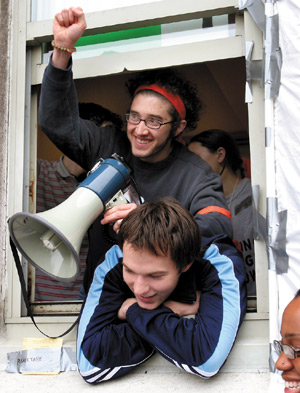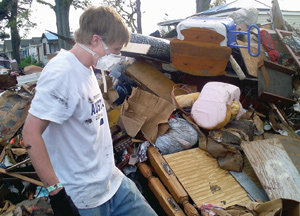 Student Life Archives
Student Life ArchivesThe 2004-2005 school year was one of transformation and change. From events of national importance, including the presidential debates and election, to campus-centric protests with the recent Student Worker Alliance sit-in, St. Louis and the University spent the year in the spotlight.
Washington University began the 2004-2005 school year as the host of a 2004 presidential debate between Democratic contender John Kerry and Republican incumbent President George W. Bush. Leading up to the big event, the University transformed the Athletic Complex, installed state-of-the-art communication and put in extra security to prepare for the grand event.
Bush’s advisory team put the debate in jeopardy at the last minute when they became hesitant to participate in the event. Following Bush’s announcement, Chris Heinz, Kerry’s stepson, visited the campus to assure the University that his step-father might still appear on campus even if Bush rejected the scheduled debate. The Commission on Presidential Debates confirmed that both candidates had committed to participate in three debates, including the Oct. 8 debate at the University.
During the week of Oct. 8, the campus transformed into a political campground, attracting media from MSNBC prime time show ‘Hardball with Chris Matthews’ and CNN’s prime debate coverage featuring Paula Zhan, Anderson Cooper and Wolf Blitzer. Students witnessed the fervor of 2004 election year in their very own campus.
Almost a month after the debate, on Nov. 4, the nation reelected President Bush into office. While Bush took the state of Missouri, St. Louis remained a blue dot in the sea of red Missouri.
Washington University also experienced waves of theft on campus. In November, WUPD retrieved a stolen laptop through a sting operation and arrested the perpetrator, a student from another St. Louis university. Later that week, a member of the housekeeping staff was caught stealing a laptop at Rublemann Hall, while in April several cars were reported stolen from Washington University property.
The fall of 2004 also brought new changes at Frat Row: no alcohol until spring semester. A student initiated a brawl at Sigma Alpha Epsilon, which injured a security guard, leading to tighter rules on the presence of alcohol on campus. Despite the alcohol ban, fraternities still experienced an increase in the number of students rushing to join the brothers on the Row. The Greek Life Office lifted the ban for the spring semester.
Greek Life’s affair with alcohol continued to mid-March, when Alpha Phi sorority sisters were kicked out of the City Museum during their formal after administrators discovered intoxicated sisters passing out in the women’s bathroom as well as in front of Girl Scouts. The following Wednesday, when the Alpha Phi story was published, hundred of copies of Student Life were stolen and stashed into nearby trashcans.
In that week, Student Life discovered another alcohol mishap when several Lee 3 residents allegedly defecated in and vandalized their RA’s room. The news came as shock to the campus and administrations and much to the dismay of Lee 3, which was soon declared into a substance free area. The week’s incidents brought a tainted image to the University as well as spreading awareness about the effects of alcohol on students’ abilities to make rational judgments.
Because of the appearances of Bush and Kerry, the University invited various speakers to lead 2004-2005 public assembly series. From Seth MacFarlane, the creator of Family Guy, to civil rights activist Robert Moses, the University offered various genres of lectures from the fields of science and the humanities. Speakers included Chris Heinz, Robert Kerry, Piper, Sherman Alexie and Anita Diamant, among others.
The school encountered difficulties in bringing two outspoken political activists: Michael Moore and Sean Hannity. Both speakers were scheduled to visit the campus, but Hannity’s demand for a private jet and Moore’s pneumonia caused them to miss their appearances.
Off campus and outside of St. Louis, this year also marked the death of Christopher Reeve, the original Superman, Yasser Arafat, the leader of Palestine, and Pope John Paul II, the head of the Catholic Church. On our own campus, students read the news that junior Jessica Campbell passed away during spring break from a heart attack.
Student Union underwent a transformation when vice president Katie Lekihim resigned, forcing it to elect a new VP. Former speaker of the Senate Pamela Bookbinder was elected as the new vice president after the resignation of Lekihim, who had been on medical leave during first semester. The process of electing the new VP came under a heat of debate when the question occurred among senators as to whether or not reporters should be allowed inside the room to watch the voting process. In the end, the election took place behind the closed doors.
Students also saw changes in financial loans and tuition. Parents were notified of an additional tuition increase to approximately $31,000 per year. Students also received a shock when they heard that Pell grants and Perkins loans were facing elimination by the Bush administration. These fears later proved baseless as Congress just passed a budget approving both programs this past week.
The year culminated with an unexpected twist as students, faculty, administration and the nation watched the Student Worker Alliance (SWA) occupy the admissions office for 19 days in April. Starting on April 4, approximately 14 University students protested inside the admission office to demand living wage of third party workers at the University.
During the protest, the administration sent multiple letters asking the protesters to leave the admissions office, stating that their presence was in violation of the judicial code. The letter only fueled the students’ fervor, eventually leading to a hunger strike. Dozens of professors signed a letter in support of SWA’s fight for a living wage, while other students protested against their effort as anti-protesters outside in the Quad.
The sit-in eventually ended on April 22 after 19 days of student occupation. The final agreement reached between the SWA and the University included a commitment of $500,000 during the 2005-’06 fiscal year towards improving the living wages and the benefits of lower-paid service workers. It also included various other concessions to SWA’s demands.
The year 2004-2005 ended with the display of students’ fight against injustice as well as those who will face justice as a consequence of their irresponsible actions. In the world, people responded with compassion while aiding victims of natural disasters, including the tsunami in southeast Asia. In the nation, Americans elected President Bush for another term.
 Student Life Archives
Student Life Archives Scott Bressler
Scott Bressler Scott Bressler
Scott Bressler